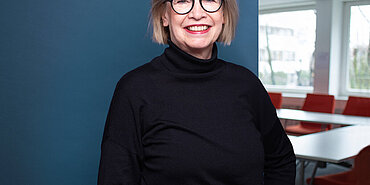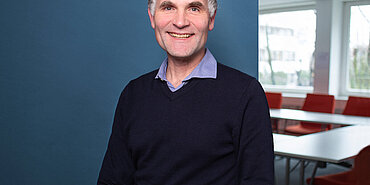Monday afternoon in the youth hostel in Berlin-Ostkreuz. 120 people are jostling for space in the conference room. It’s the day after the presidential elections in Turkey and many of the participants who have travelled to Berlin to attend “New Narratives” appear overtired, having spent half the night in front following the vote-counting on TV. Jochen Butt-Posnik and Gülesin Nemutlu, the hosts of the four-day conference, start by referencing the elephant in the room: the dwindling room for manoeuvre for Turkish NGOs and the growing strain on German-Turkish relations. Given the circumstances, is it possible to have a frank discussion of the future of German-Turkish youth exchanges?
As the next days showed, it is indeed possible. The fact that “New Narratives” took place in such an open atmosphere cannot be prized highly enough. Indeed, the fact that the conference took place at all and that its attendees were willing to continue existing projects and strike up new partnerships is a major success.
Exchange in a globalised world
The first evening of the conference was an opportunity to get to know each other and also a reminder of why participants had come to Berlin in the first place. IJAB Programme Associate Christiane Reinholz-Asolli recalled that in the run-up to the 1994 signing of the agreement between the German and Turkish youth ministries, there had been a number of deadly racist attacks in Germany. In fact, the agreement was drawn up as a sign of both sides’ willingness to address existing prejudices. While this vision has not changed, we live in a different world today – a smaller one. “In a globalised world, German and Turkish youngsters face many of the same challenges,” as Ibrahim Demirel from the Turkish national agency put it. “It is worrying that Europe is in the process of erecting borders that we thought were torn down long ago,” added his German colleague Manfred von Hebel. And as it happened, the agenda of the four-day conference went beyond matters relating to German-Turkish bilateral relations.
What do young people need so they can take action?
The project marketplace was where organisations already engaging in German-Turkish exchanges could showcase their activities. They fielded many curious questions from young people, typically school exchange participants or university students who had completed a term abroad and who have German-Turkish family backgrounds and want to take action. Some of them have decided to join a small NGO, but some are going it alone. “First step: find yourself an NGO,” advised Jochen Butt-Posnik. But what other success factors are there? During the conference most of the young people flocked to the workshops, which focused on hands-on activities like dance theatre, language animation, game design, youth exchange leadership and participation. The presence of so many young people demonstrated that capacity building, empowerment and partnership-building are the main factors that will determine the success of future German-Turkish exchanges.
Diverse realities, polarised societies
How are young Germans and Turks growing up today? It is important to be mindful of the realities they face before designing activities that aim to respond to young people’s needs and concerns. Christine Uhlmann from the SINUS Institute talked the audience through the SINUS youth study, which is done every four years to examine sociocultural trends and build models. The study covers values, attitudes, lifestyles, education and socioeconomic aspects and delivers a profound insight into the different realities faced by today’s young people and the desires they have for the future. “Youth” is not a homogeneous group. Organisations that wish to offer them relevant activities have to adapt to the young people’s widely varying needs and understand the circumstances under which they are growing up – and that includes their music preferences.
“My ears are bleeding,” sighed Professor Özgehan Şenyuva from the University of Ankara, as the last music clip from Christine Uhlmann’s keynote address ended. “If you want to know how young Turks are growing up today, you need to understand how Turkish society has developed,” he continued. Şenyuva observes that today’s Turkish society is exceptionally polarised; while it has “pockets of consensus”, he explained, they are a matter of concern, for many of their adherents are united in anti-Western sentiment, Euroscepticism, or a dislike of migrants. The middle classes, a social group that has grown under Erdoğan’s presidency, are in a precarious situation, said Şenyuva, since they are aware that they may lose their relative prosperity at any time. This sense of “living on thin ice” has generated a nostalgic yearning among middle-class Turks for what they think are the good old days of the Ottoman Empire.
Professor Şenyuva did not believe his diagnosis is exclusive to Turkey. Comparable tendencies are observable in many countries, he explained, which presents us all with a challenge. But he also had some good news to share: Turkey is one of the top countries when it comes to European Voluntary Service participation. In fact, some former EVS participants have come to Berlin because they want to do more.
Learning from Tombi the cat
Three million people have fled the war in Syria to make Turkey their long-term home. Ayşe Beyazova Seçer from Boğaziçi University in Istanbul has worked with refugee children and is studying how to create a space in which “we can all breathe and where we feel respected,” as she said. Flight, migration and inclusion are major topics of discussion both in Germany and in Turkey.
“Everyone in Turkey has heard about Tombi the cat,” Ayşe Beyazova Seçer said. Tombi lived in the garden of a school and was an occasional presence in the classroom. Most of the time the cat slept – and the children were quiet and attentive in class because they didn’t want to wake it. But then the school principal decided to ban the cat from the building. Parents, the media and even the Ministry of Education intervened so that the cat could stay. “We can learn a lot from Tombi,” said Seçer. “Inclusive learning requires access to education, flexibility, cooperation, and the willingness to change perspectives. The result is an inclusive culture.”
Next steps
Before the conference began, Jan Taşçı from the organisation Deutsch-Türkische Jugendbrücke had been asked about his expectations of the event. “The conference will have been a success if we manage to step away from our everyday lives, talk to each other, fill our notebooks with ideas, build a long list of potential partners and can return home inspired,” he answered. “New Narratives” managed to make a lot of that happen. Now, it will have to be considered how the many young participants can be assisted in fulfilling their own wishes and how to meet the urgent need for partners that was revealed during the conference. And the elephant that was in the room on day one? It turned out to be rather a small one.
“Different Views and New Narratives – (Re)Thinking Bridges between Young People in Germany and Turkey” was co-organised by Deutsch-Türkische Jugendbrücke, the National Agencies for Erasmus+ Youth in Action of Germany and Turkey, and IJAB. The German-Turkish online magazine MAVIBLAU will document the proceedings.




